Letters to Fathers
from Feb. 12, 1928
"Tragedy of Lincoln's Death Halted Feast of Rejoicing"
-
Full Title
"Tragedy of Lincoln's Death Halted Feast of Rejoicing"
-
Description
In 1928, Robert Brown recounted his childhood as the son of White House butler and waiter Peter Brown. Peter Brown, a formerly enslaved man, worked in the Lincoln White House. In the interview, Robert Brown discussed his early childhood in Virginia, his family's move to Washington, getting to know President Lincoln and his children, and learning of Lincoln's assassination. The newspaper page also includes other articles about Lincoln.
-
Transcription
[interviewer:] "Where were you on the night of the assassination?"
[Brown:] "I was home on Twelfth street., between O and H. about three or four blocks from Ford's. It was about half past 10 and I was taking off my clothes to go to bed. My father had just left the house, saying he had orders to return to the Executive Mansion about 11 and help with a supper they intended to have, and he would be beck when he could, but he didn't say what time. He went out and I was just ready to crawl into bed when I heard a big commotion in the street, men running this way and that, people shouting, military giving orders, horses dashing by. When I stuck my head out the door some one ran up, saying Mr. Lincoln was shot at the theater. My mother pulled me back in the house and made me stay in bed. She said it was dangerous to be out, and we should stay in. We kept awake till my father returned and told us of the excitement over at the White House. He stayed over there trying to comfort Tad, but after putting him to bed there wasn't anything he could do, so he locked up after a while and came home. Then I fell asleep."
[interviewer:] "Who was to have made up the party over at the White House?"
[Brown:] "That I couldn't say. My father just said they were to have some kind of supper after the performance, and he was needed there."
[interviewer:] "How many were invited?"
[Brown:] "That I don't know, sir. You see, my father wasn't the steward, otherwise he would have known how many. He only helped wait on the table in emergencies, and I can't say whether he was to do table duty that night."
[interviewer:] "Were the guests coming from Ford's Theater with the Lincolns or from elsewhere?"
[Brown:] "That, sir, is beyond me." -
Source
Chronicling America: Historic American Newspapers, Library of Congress
-
Rights
This item is in the public domain.
-
Tags
-
Cite this Item
George M. Battey, Jr.. ""Tragedy of Lincoln's Death Halted Feast of Rejoicing"". The Washington Star. Remembering Lincoln. Web. Accessed December 14, 2025. https://rememberinglincoln.fords.org/node/1214
-
Creator
George M. Battey, Jr.
-
Publisher
The Washington Star
-
Date
February 12, 1928
from Feb. 12, 1928
"Tragedy of Lincoln's Death Halted Feast of Rejoicing"

-
Description
In 1928, Robert Brown recounted his childhood as the son of White House butler and waiter Peter Brown. Peter Brown, a formerly enslaved man, worked in the Lincoln White House. In the interview, Robert Brown discussed his early childhood in Virginia, his family's move to Washington, getting to know President Lincoln and his children, and learning of Lincoln's assassination. The newspaper page also includes other articles about Lincoln.
-
Source
Chronicling America: Historic American Newspapers, Library of Congress
-
Rights
This item is in the public domain.
-
Creator
George M. Battey, Jr.
-
Publisher
The Washington Star
-
Date
February 12, 1928
from Apr. 17, 1865
A Deed Without a Name
-
Full Title
A Deed Without a Name
-
Description
This editorial was published in the Union Vedette, a newspaper published by United States soldiers stationed at Camp Douglas in Salt Lake City, Utah. It passionately denounces the perpetrators of the assassination and conveys the shock and sadness felt among the soldiers at Camp Douglas upon receiving news of Lincoln's death. The author condemns not only the conspirators but the Confederacy as a whole, while glorifying Lincoln as the "great Liberator."
-
Source
Utah Digital Newspapers Contributed by McKayla Herron, M.A. Student in Public History, West Virginia University
-
Rights
This item is in the public domain and may be reproduced and used for any purpose, including research, teaching, private study, publication, broadcast or commercial use, with proper citation and attribution.
-
Tags
-
Cite this Item
Union Vedette. "A Deed Without a Name". Union Vedette. Remembering Lincoln. Web. Accessed December 14, 2025. https://rememberinglincoln.fords.org/node/1213
-
Creator
Union Vedette
-
Publisher
Union Vedette
-
Date
April 17, 1865
from Apr. 17, 1865
A Deed Without a Name
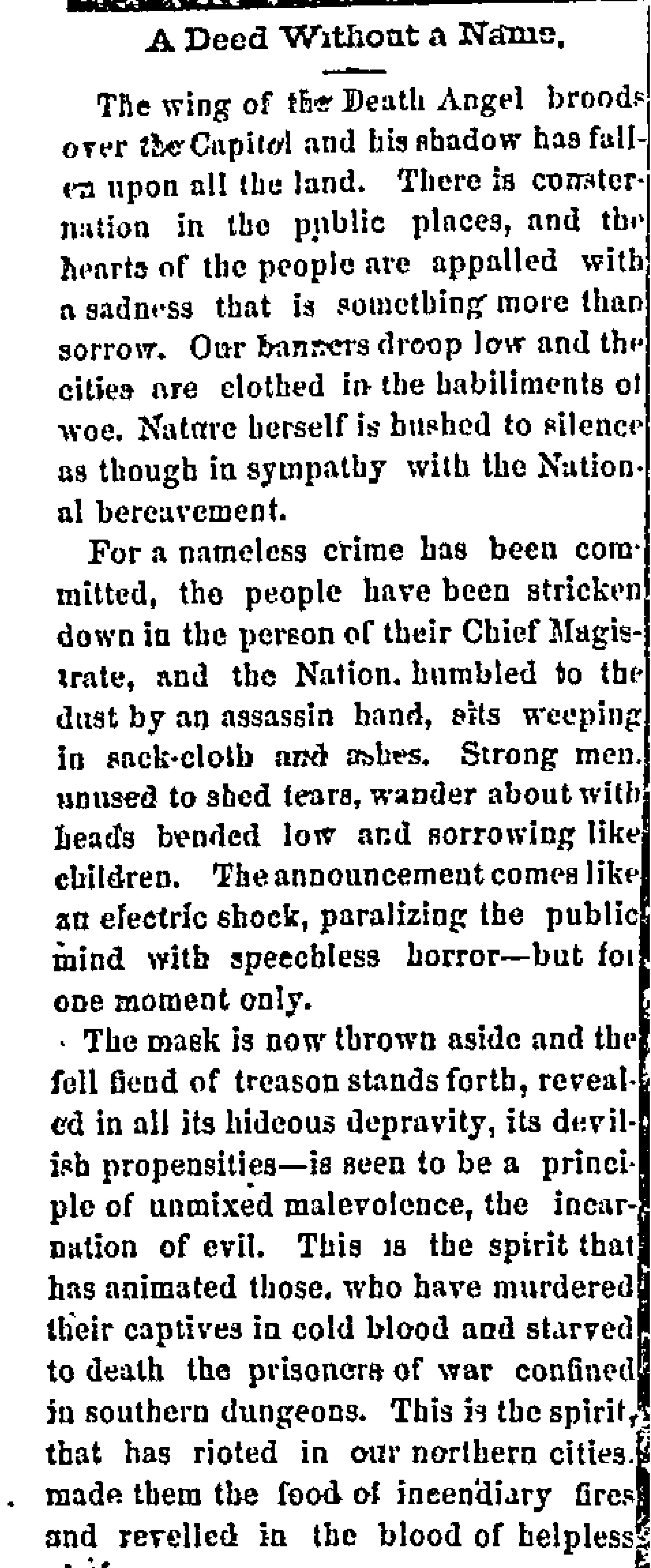
-
Description
This editorial was published in the Union Vedette, a newspaper published by United States soldiers stationed at Camp Douglas in Salt Lake City, Utah. It passionately denounces the perpetrators of the assassination and conveys the shock and sadness felt among the soldiers at Camp Douglas upon receiving news of Lincoln's death. The author condemns not only the conspirators but the Confederacy as a whole, while glorifying Lincoln as the "great Liberator."
-
Source
Utah Digital Newspapers Contributed by McKayla Herron, M.A. Student in Public History, West Virginia University
-
Rights
This item is in the public domain and may be reproduced and used for any purpose, including research, teaching, private study, publication, broadcast or commercial use, with proper citation and attribution.
-
Creator
Union Vedette
-
Publisher
Union Vedette
-
Date
April 17, 1865
from Apr. 18, 1865
Local Matters
-
Full Title
Local Matters
-
Description
This article was published in the Union Vedette, a newspaper published by United States soldiers stationed at Camp Douglas in Salt Lake City, Utah. It describes the initial reaction to the news of the assassination at Camp Douglas and throughout Salt Lake City. To express their grief and honor the late president, soldiers wore badges of mourning and fired a gun every half hour throughout the day. Citizens closed their business, flags flew at half mast, and Brigham Young's carriage was draped in mourning.
-
Source
Utah Digital Newspapers Contributed by McKayla Herron, M.A. Student in Public History, West Virginia University
-
Rights
This item is in the public domain and may be reproduced and used for any purpose, including research, teaching, private study, publication, broadcast or commercial use, with proper citation and attribution.
-
Tags
-
Cite this Item
Union Vedette. "Local Matters". Union Vedette. Remembering Lincoln. Web. Accessed December 14, 2025. https://rememberinglincoln.fords.org/node/1212
-
Creator
Union Vedette
-
Publisher
Union Vedette
-
Date
April 18, 1865
from Apr. 18, 1865
Local Matters
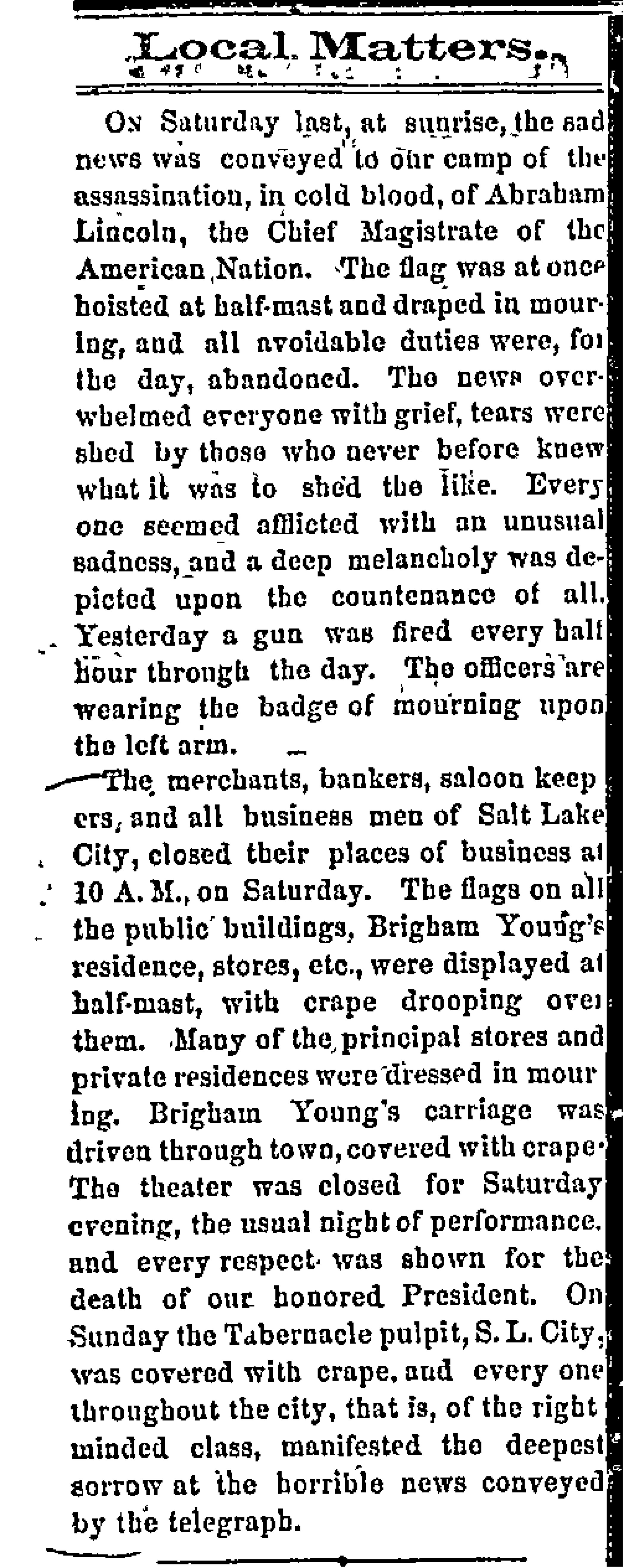
-
Description
This article was published in the Union Vedette, a newspaper published by United States soldiers stationed at Camp Douglas in Salt Lake City, Utah. It describes the initial reaction to the news of the assassination at Camp Douglas and throughout Salt Lake City. To express their grief and honor the late president, soldiers wore badges of mourning and fired a gun every half hour throughout the day. Citizens closed their business, flags flew at half mast, and Brigham Young's carriage was draped in mourning.
-
Source
Utah Digital Newspapers Contributed by McKayla Herron, M.A. Student in Public History, West Virginia University
-
Rights
This item is in the public domain and may be reproduced and used for any purpose, including research, teaching, private study, publication, broadcast or commercial use, with proper citation and attribution.
-
Creator
Union Vedette
-
Publisher
Union Vedette
-
Date
April 18, 1865
from Apr. 21, 1865
Funeral Obsequies of President Lincoln
-
Full Title
Funeral Obsequies of President Lincoln
-
Description
This article was published in the Union Vedette, a newspaper published by United States soldiers stationed at Camp Douglas in Salt Lake City, Utah. It discusses a meeting in which the Utah territory's federal, civil, and military officials adopted multiple resolutions related to the Lincoln assassination and planned for the city's memorial service. It expresses grief over Lincoln's death and extols his "integrity and ability as a magistrate," while endorsing Andrew Johnson as the new president.
-
Transcription
Funeral Obsequies of President Lincoln
At a meeting of the Federal, Civil and Military officials of Utah, held at the Executive in Great Salt Lake City, April 18th at two P.M., Hon. J. Duane Doty, Governor, was called to the chair, Capt. C.H Hemstead and T.B. H. Stenhouse, Esq., appointed Secretaries.
After preliminary consultation and expression of feeling over the sad event which called this meeting together, the following resolutions. presented by Hon. Chief Justice Titas, were unanimously adopted:
Whereas, the death by assassination of our beloved President. has wrung the hearts of all good men with grief;
Whereas, the serious wounding, by lawless violence, of our esteemed and honored Secretary of State, and his two sons, mingles with the sorrow of actual bereavement, the painful apprehension of further heart-rending loss and;
Whereas, also, in this our hour of calamity, we may not inappropriately seek that relief which affliction finds in outward expression! Therefore,
Resolved. That we cannot suppress the profound sorrow, with which we lament the untimtely death of our beloved President Abraham Lincoln, whose integrity and ability as a magistrate had secured for him the confidence of his country and whose genial virtues as a man, had endeared him to humanity itself:
Resolved. That with unaffected grief for our lamented President, is mingled the poignant regret, that he has not been spared to see and enjoy the fruition of that peace which has his labors had done so much to secure for his country, and which we believe is not far distant;
Resolved, That while we thus lament for our friend, the exemplary husband and father. we cannot forget the stricken family, but with a feeling of unaffected condolence humbly invoke for them that support, which transcends all human woe, in the divine power of its consolation;
Resolved, That we devotedly hope that the wounds of our able and honored Secretary of State William H. Seward, and his two sons, may none of them prove mortal but that they may all soon be restored to health. and long spared for further useful service, to our common country;
Resolved. That we have the fullest confidence in our President Andrew Johnson, our own and the Nation’s choice, as he was for the second. prepared by labor and trial as he was for the first office in government. and to which he is thus translated by the peration of the Constitution and the permission of a tremendous Providence.
Resolved. That a committee of five be appointed on the part of the Federal offices to confer with a committee of like number on the part of the city authorities. to make arrangements for suitable religious exercises to be held at the Tabernacle, April 19th, at twelve o’-clock, M.
Col. J.C. Little informed the meeting that Elder Amasa M. Lyman had been selected by city authorities to deliver an address at the Tabernacle.
Oh motion, it was unanimously resolved the Rev. Normal McLeod be also invited to deliver an eulogium on the life, character and illustrious services of the late President, on the same occasion and at-the-same place.
In accordance with the foregoing resolutions the following gentlemen were appointed by the Chair as the Committee of Arrangements. viz: Hon. Chief Justice John Titus, Col. O. H. Irish, Capt Chas H. Hempstead, Col. Robt. T. Burton and Col. I C Little.
Following is the committee appointed on behalf of the city authorities. viz: Hon. Mayor Smoot, Alderman Sheets, Alderson Raleigh, Thos. McKeon and N. H. Felt, E-qs.
On motion, the Secretaries were instructed to transmit a copy of the proceedings of this meeting to the City Council, and that public notice be given of the exercises at the Tabernacle.
J. DUANE DOTY, President.
T.B.H. Stenhouse,
Chas H. Hempstead } Secretaries
[Transcription by Alicia B., Ford's Theatre Society, and Janet Scanlon.]
-
Source
Utah Digital Newspapers Contributed by McKayla Herron, M.A. Student in Public History, West Virginia University
-
Rights
This item is in the public domain and may be reproduced and used for any purpose, including research, teaching, private study, publication, broadcast or commercial use, with proper citation and attribution.
-
Tags
-
Cite this Item
Union Vedette. "Funeral Obsequies of President Lincoln". Union Vedette. Remembering Lincoln. Web. Accessed December 14, 2025. https://rememberinglincoln.fords.org/node/1211
-
Creator
Union Vedette
-
Publisher
Union Vedette
-
Date
April 21, 1865
from Apr. 21, 1865
Funeral Obsequies of President Lincoln
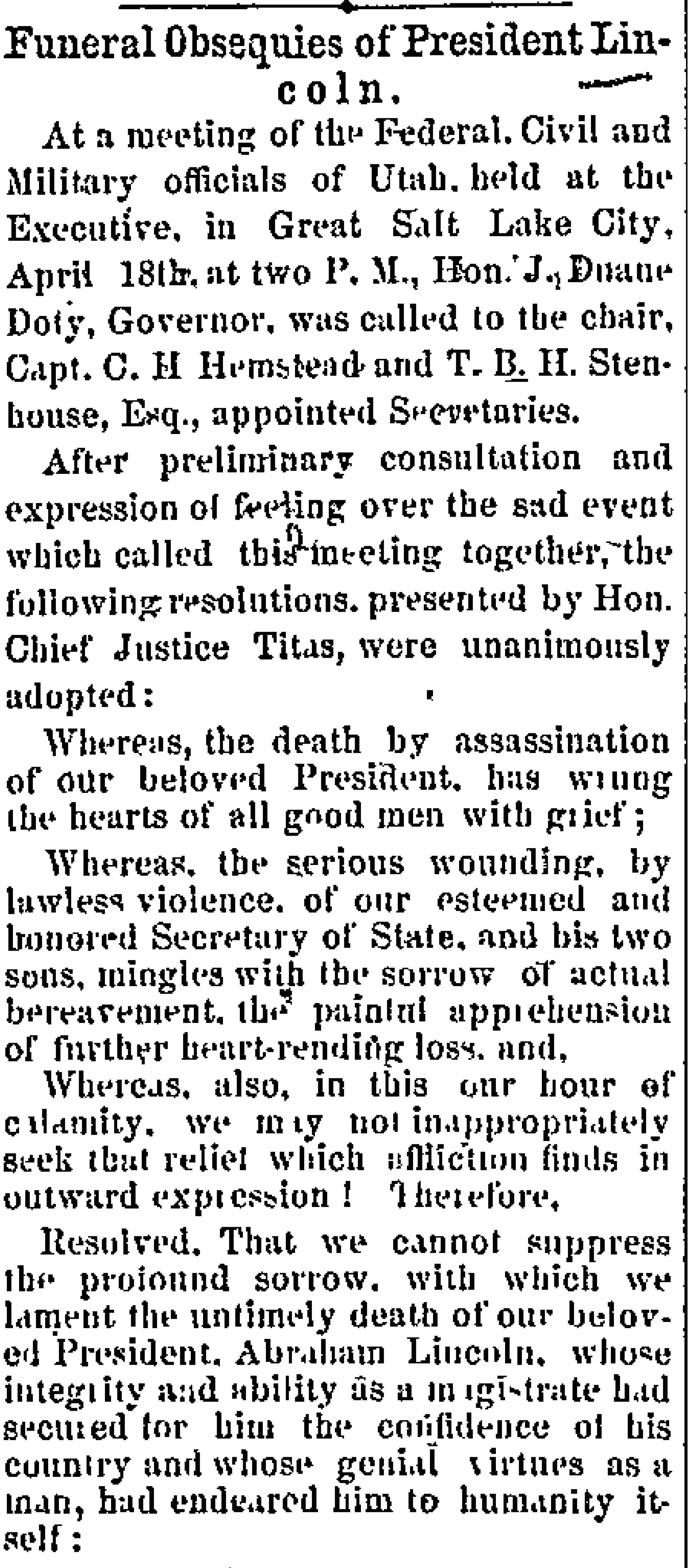
-
Description
This article was published in the Union Vedette, a newspaper published by United States soldiers stationed at Camp Douglas in Salt Lake City, Utah. It discusses a meeting in which the Utah territory's federal, civil, and military officials adopted multiple resolutions related to the Lincoln assassination and planned for the city's memorial service. It expresses grief over Lincoln's death and extols his "integrity and ability as a magistrate," while endorsing Andrew Johnson as the new president.
-
Source
Utah Digital Newspapers Contributed by McKayla Herron, M.A. Student in Public History, West Virginia University
-
Rights
This item is in the public domain and may be reproduced and used for any purpose, including research, teaching, private study, publication, broadcast or commercial use, with proper citation and attribution.
-
Creator
Union Vedette
-
Publisher
Union Vedette
-
Date
April 21, 1865
from Apr. 19, 1865
Home Items
-
Full Title
Home Items
-
Description
This article, published in Salt Lake City's Deseret News, discusses a Sunday church service held in the city a few days after Lincoln's assassination. Wilford Woodruff, F. D. Richards, and George Q. Cannon of the Church of Jesus Christ of Latter-day Saints each spoke on topics related to the assassination, including the uncertainty of human life, the country's mourning, and the privileges of American citizenship. Cannon compared the assassination of Abraham Lincoln to the murder of LDS Prophet Joseph Smith.
-
Transcription
HOME ITEMS.
SABBATH MEETINGS. – Elder Wilford Woodruff preached a highly instructive and truly edifying discourse upon the uncertainty of human life, the present mournful condition of our country, occasioned by the assassination of our Chief Magestrate, and the fearful state of feeling that must exist with those who plotted as well as those who carried out the murderous scheme.
AFTERNOON.
Elder F. D. Richards addressed the congregation upon the privileges and comforts enjoyed by American citizens, and stated that if they did not realize their blessings while at home, when that portion of them who were Elders in this Church went abroad on missions to the despotic nations of the Old World, they were made to understand the importance of American citizenship.
Elder George Q. Cannon followed upon the same subject and also reviewed the once unhappy sadness that prevailed in the Church of Jesus Christ of Latter-day Saints, consequent upon the perpetration of a like wicked but more dastardly act of cruel murder done in cold blood.
[Transcription by Alicia B., Ford's Theatre Society, and Janet Scanlon.] -
Source
Utah Digital Newspapers Contributed by McKayla Herron, M.A. Student in Public History, West Virginia University
-
Rights
This item is in the public domain and may be reproduced and used for any purpose, including research, teaching, private study, publication, broadcast or commercial use, with proper citation and attribution.
-
Tags
-
Cite this Item
Deseret News. "Home Items". Deseret News. Remembering Lincoln. Web. Accessed December 14, 2025. https://rememberinglincoln.fords.org/node/1210
-
Creator
Deseret News
-
Publisher
Deseret News
-
Date
April 19, 1865
from Apr. 19, 1865
Home Items
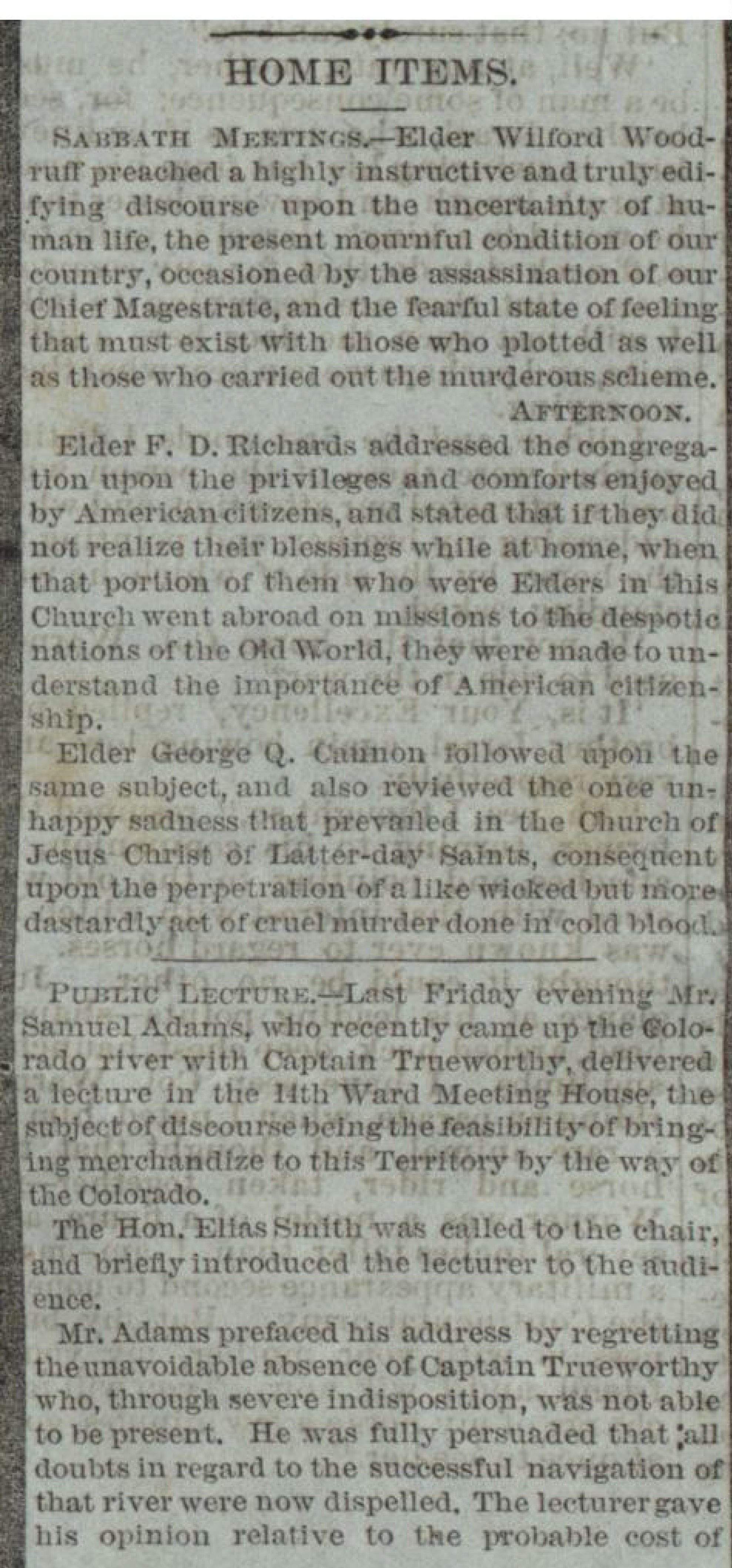
-
Description
This article, published in Salt Lake City's Deseret News, discusses a Sunday church service held in the city a few days after Lincoln's assassination. Wilford Woodruff, F. D. Richards, and George Q. Cannon of the Church of Jesus Christ of Latter-day Saints each spoke on topics related to the assassination, including the uncertainty of human life, the country's mourning, and the privileges of American citizenship. Cannon compared the assassination of Abraham Lincoln to the murder of LDS Prophet Joseph Smith.
-
Source
Utah Digital Newspapers Contributed by McKayla Herron, M.A. Student in Public History, West Virginia University
-
Rights
This item is in the public domain and may be reproduced and used for any purpose, including research, teaching, private study, publication, broadcast or commercial use, with proper citation and attribution.
-
Creator
Deseret News
-
Publisher
Deseret News
-
Date
April 19, 1865
from Apr. 19, 1865
"Our Nation Mourning"
-
Full Title
"Our Nation Mourning"
-
Description
This article was published in Salt Lake City's Deseret News on April 19, 1865. It describes the city's initial reaction to the Lincoln assassination, announcing a memorial service to be held in the Latter-day Saint tabernacle, the suspension of business and entertainment throughout the city, and the decoration of public buildings
-
Transcription
Upon the reception of the horrifying intelligence that President Lincoln had been assassinated, throughout the city business was generally suspended, flags were draped in mourning at halfmast, stores and other public buildings were closed and craped, the Management of the Theatre announced that the bill for Saturday evening was postponed to Monday, and deep gloom palpably rested upon the minds of the citizens.
On Sunday the stand and organ in the Tabernacle were clad in the habiliments of woe, as were also many members of the congregation, and Elders W. Woodruf, F.D. Richards and George Q. Cannon delivered feeling and appropriate addresses upon the solemn occasion. Monday evening the proscenium boxes of the Theatre and two large national flags arching from the center over the drop curtain were draped in black.
Alas for the times, when our Chief Magistrate can be stricken down by the hands of an assassin! -
Source
Utah Digital Newspapers Contributed by McKayla Herron, M.A. Student in Public History, West Virginia University
-
Rights
This item is in the public domain and may be reproduced and used for any purpose, including research, teaching, private study, publication, broadcast or commercial use, with proper citation and attribution.
-
Tags
-
Cite this Item
Deseret News. ""Our Nation Mourning" ". Deseret News. Remembering Lincoln. Web. Accessed December 14, 2025. https://rememberinglincoln.fords.org/node/1209
-
Creator
Deseret News
-
Publisher
Deseret News
-
Date
April 19, 1865
from Apr. 19, 1865
"Our Nation Mourning"

-
Description
This article was published in Salt Lake City's Deseret News on April 19, 1865. It describes the city's initial reaction to the Lincoln assassination, announcing a memorial service to be held in the Latter-day Saint tabernacle, the suspension of business and entertainment throughout the city, and the decoration of public buildings
-
Source
Utah Digital Newspapers Contributed by McKayla Herron, M.A. Student in Public History, West Virginia University
-
Rights
This item is in the public domain and may be reproduced and used for any purpose, including research, teaching, private study, publication, broadcast or commercial use, with proper citation and attribution.
-
Creator
Deseret News
-
Publisher
Deseret News
-
Date
April 19, 1865
from May. 22, 1865
Letter from Pablo Herrera
-
Full Title
Letter from Pablo Herrera to Mr. Hassaurek
-
Description
Pablo Herrera, foreign minister of Ecuador, expressed his nation’s condolences to the United States on May 22, 1865.
-
Transcription
Transcription is available through the Department of State Office of the Historian
-
Source
-
Rights
This item is in the public domain and may be reproduced and used for any purpose, including research, teaching, private study, publication, broadcast or commercial use, with proper citation and attribution.
-
Tags
-
Cite this Item
Pablo Herrera. "Letter from Pablo Herrera to Mr. Hassaurek". Remembering Lincoln. Web. Accessed December 14, 2025. https://rememberinglincoln.fords.org/node/1208
-
Creator
Pablo Herrera
-
Date
May 22, 1865
from May. 22, 1865
Letter from Pablo Herrera to Mr. Hassaurek
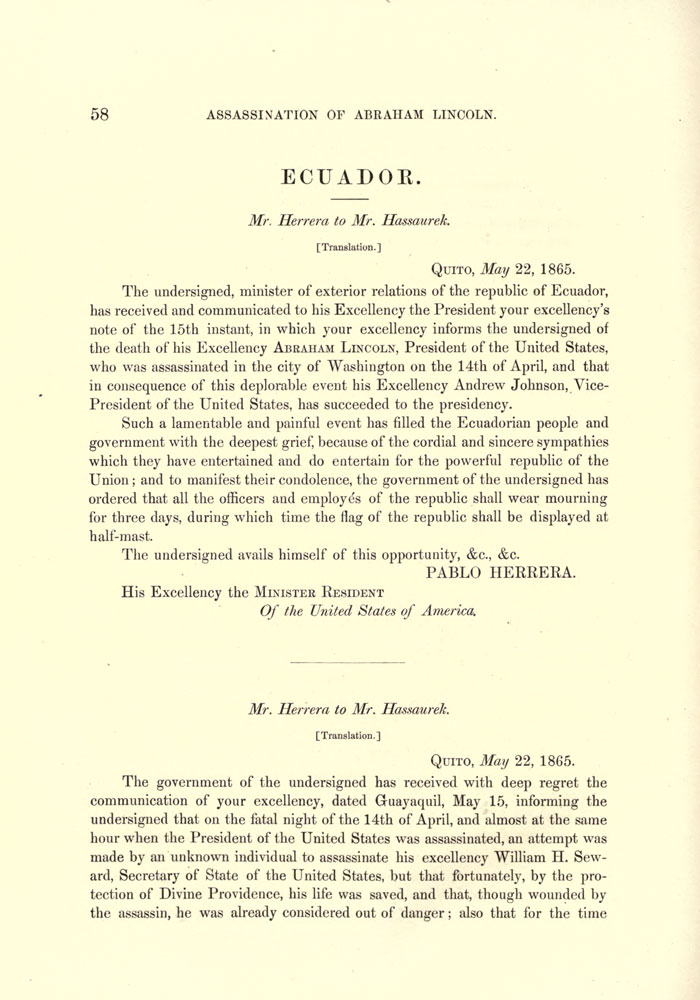
-
Description
Pablo Herrera, foreign minister of Ecuador, expressed his nation’s condolences to the United States on May 22, 1865.
-
Source
-
Rights
This item is in the public domain and may be reproduced and used for any purpose, including research, teaching, private study, publication, broadcast or commercial use, with proper citation and attribution.
-
Creator
Pablo Herrera
-
Date
May 22, 1865
from May. 9, 1865
From the Legation of His Imperial Majesty the Shah of Persia
-
Full Title
From the Legation of His Imperial Majesty the Shah of Persia
-
Description
A message from the legation of the Shah of Persia offering condolences on behalf of the leader and the people of Persia. The Shah transmitted this message via telegram to his emissary Suleiman Khan in Paris, who passed it along to the new President as a gesture of goodwill. Such a message demonstrates just how widely felt the impacts of Lincoln's death were.
-
Transcription
Transcription available through the Department of State Office of the Historian
-
Source
-
Rights
This item is in the public domain and may be reproduced and used for any purpose, including research, teaching, private study, publication, broadcast or commercial use, with proper citation and attribution.
-
Tags
-
Cite this Item
Suleiman Khan. "From the Legation of His Imperial Majesty the Shah of Persia". Remembering Lincoln. Web. Accessed December 14, 2025. https://rememberinglincoln.fords.org/node/1206
-
Creator
Suleiman Khan
-
Date
May 09, 1865
from May. 9, 1865
From the Legation of His Imperial Majesty the Shah of Persia
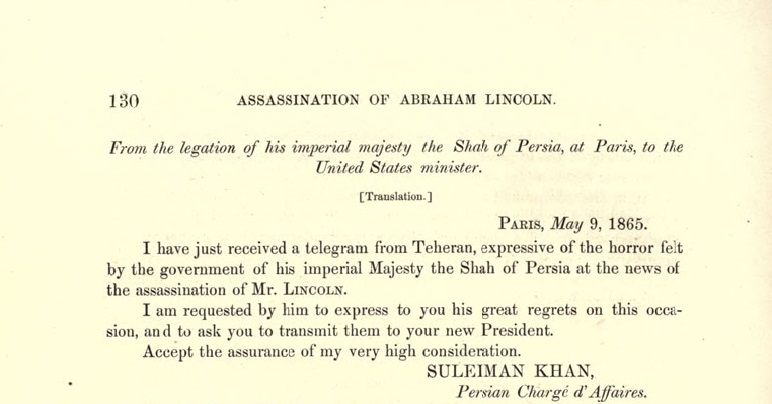
-
Description
A message from the legation of the Shah of Persia offering condolences on behalf of the leader and the people of Persia. The Shah transmitted this message via telegram to his emissary Suleiman Khan in Paris, who passed it along to the new President as a gesture of goodwill. Such a message demonstrates just how widely felt the impacts of Lincoln's death were.
-
Source
-
Rights
This item is in the public domain and may be reproduced and used for any purpose, including research, teaching, private study, publication, broadcast or commercial use, with proper citation and attribution.
-
Creator
Suleiman Khan
-
Date
May 9, 1865
from May. 2, 1865
Inhabitants of Zurich
-
Full Title
Inhabitants of Zurich
-
Description
A letter of condolences written to the US Government by a committee of residents from the Swiss city of Zurich. The committee praises the Union victory over the Confederacy, noting its impacts on not only the United States but also "all mankind". While mourning Lincoln, the document makes comparisons between Lincoln's impact and the previous global political impact of the Revolutionary War and George Washington. This letter provides a window into global reactions to the end of the war, as well as international opinions on what the role of a post-war United States would look like.
-
Transcription
Transcription is available via the Department of State Office of the Historian.
-
Source
-
Rights
This item is in the public domain and may be reproduced and used for any purpose, including research, teaching, private study, publication, broadcast or commercial use, with proper citation and attribution.
-
Tags
-
Cite this Item
O. Bulle. "Inhabitants of Zurich". Remembering Lincoln. Web. Accessed December 14, 2025. https://rememberinglincoln.fords.org/node/1205
-
Creator
O. Bulle
-
Date
May 2, 1865
from May. 2, 1865
Inhabitants of Zurich
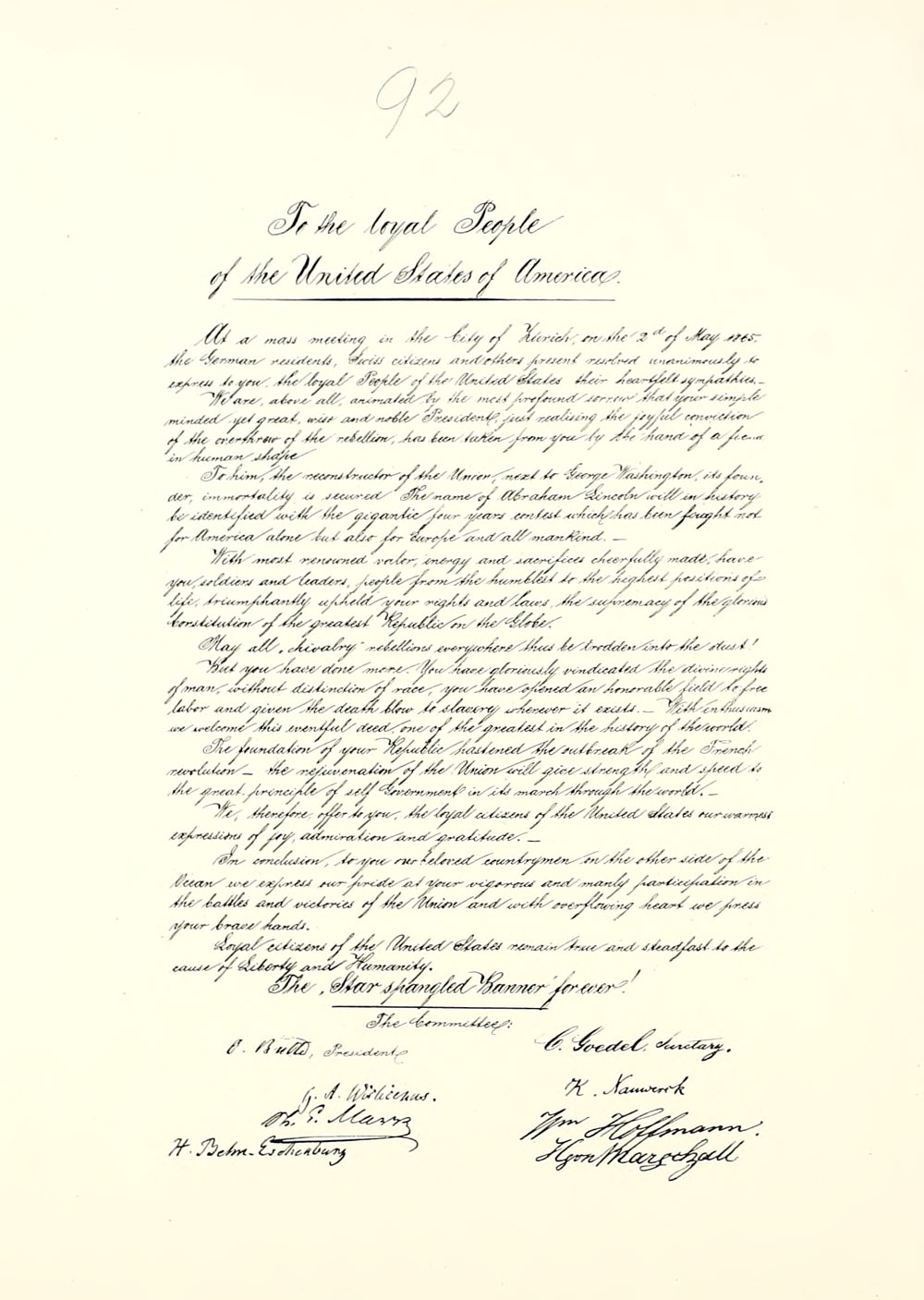
-
Description
A letter of condolences written to the US Government by a committee of residents from the Swiss city of Zurich. The committee praises the Union victory over the Confederacy, noting its impacts on not only the United States but also "all mankind". While mourning Lincoln, the document makes comparisons between Lincoln's impact and the previous global political impact of the Revolutionary War and George Washington. This letter provides a window into global reactions to the end of the war, as well as international opinions on what the role of a post-war United States would look like.
-
Source
-
Rights
This item is in the public domain and may be reproduced and used for any purpose, including research, teaching, private study, publication, broadcast or commercial use, with proper citation and attribution.
-
Creator
O. Bulle
-
Date
May 2, 1865